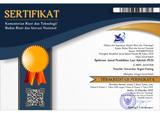Tutor Competence in Realizing the Success of Japanese Language Training Participants (Case Study at LPK Proklamator Padang)
 ), Lili Dasa Putri(2),
), Lili Dasa Putri(2), (1) Universitas Negeri Padang
(2) Universitas Negeri Padang
 Corresponding Author
Corresponding Author
DOI : https://doi.org/10.24036/spektrumpls.v12i1.127638
Full Text:
 Language : en
Language : en
Abstract
This research is motivated by the unique phenomenon in Japanese language training at LPK Proclamator, which is the number of training participants who graduated and participated At LPK Proclamator. This is influenced by the competence of a tutor. This study aims to determine the tutor's competence in Japanese language training at Padang Proclamator LPK.
This study uses a qualitative approach, with a case study research method. The data sources in this study are managers, tutors, Japanese language training participants. Data collection techniques conducted in this study are observations, interviews and documentation. Data analysis techniques used are data reduction, data presentation and drawing conclusions. Data validity techniques are by using source triangulation, triangulation of theoretical methods and triangulation.
The results of the research show that (1) The pedagogical competence of LPK proclaimer tutors is mastering the characteristics of training participants, mastering learning theory and principles of educational learning, developing a curriculum related to Japanese language training, organizing an educational learning process, utilizing information and communication for the benefit of learning, facilitating the development of the potential of training participants to actualize the various potentials they have as well as carrying out assessments and evaluations of the learning process and results. (2) Personality competency of the LPK proclaimer tutor to act in accordance with the rules, presenting oneself as an honest, wise person and displaying an authoritative personality. (3) The social competence of proclaimer LPK tutors is to be non-discriminatory, communicate effectively, empathetically and politely with fellow educators, education staff, parents and the community in the environment, and adapt to the environment where they work in order to increase their effectiveness as educators. (4) The professional competency of the Proclaimer LPK tutor is to master the material, learning objectives, structure, learning concepts and develop creative learning materials in Japanese language training at the Proclaimer LPK.
Keywords: Tutor Competency, Training, LPK
References
Agustiningsih, N., & Pamungkas, S. (2017). Peranan Pendidikan Luar Sekolah dalam Pembangunan Sumber Daya Manusia. Istoria: Jurnal Ilmiah Pendidikan Sejarah Universitas Batanghari, 1(1). https://doi.org/10.33087/istoria.v1i1.6
Andriani, D., Sarmidin, & Iswandhiarti, W. (2019). Hubungan Kompetensi Kepribadian Guru dengan Motivasi Belajar Siswa Kelas VIII Pada Mata Pelajaran Fiqh di MTs PONPES Nurul Islam Kampung Baru Toar. JOM FTK UNIKS, 1(1).
Arikunto, S. (2010). Prosedur Penelitian. Rineka Cipta.
Dira, E. (2023). The Importance of Technology Information-Based Training in the Society 4.0 Era. KOLOKIUM Jurnal Pendidikan Luar Sekolah, 11(3).
Hamzah, F., & Setiawati, S. (2020). The Relationship Between the Influence of People’s People on Learning Disciplin. SPEKTRUM: Jurnal Pendidikan Luar Sekolah, 8(3).
Harafah, P. J. M. (2023). The Importance of Training Activities Based on Environental Potential in Realising Community Welfare. KOLOKIUM Jurnal Pendidikan Luar Sekolah, 11(3).
Herdiansyah, H. (2015). Metodologi Penelitian Kualitatif untuk Ilmu Psikologi. Salemba Humanika.
Mahdona, S. O. (2023). Training Based on Environmental Potential in Pasaman Nature Activities Forest Farmers Group. KOLOKIUM Jurnal Pendidikan Luar Sekolah, 11(3).
Mulyasa, E. (2013). Standar Kompetensi dan Sertifikasi Guru. Remaja Rosdakarya.
Nurhabibah, N. (2023). The Importance of Competency Based Training in Improving Human Resources in the Digital Era. KOLOKIUM Jurnal Pendidikan Luar Sekolah, 11(3).
Nurhalima, A. S. (2023). Building Competitive Employees in the Digital Era with Competency-Based Training. KOLOKIUM Jurnal Pendidikan Luar Sekolah, 11(3).
Peraturan Pemerintah Nomor 9 Tahun 2005 Tentang Standar Nasional Pendidikan. http://biologi.fkip.uns.ac.id/wp-content/uploads/2013/08/PP-2005-19-SNP.pdf
Putri, L. D. (2020). Pengaruh Motivasi Kerja Terhadap Kinerja Pamong Belajar Pada Sanggar Kegiatan Belajar (SKB) di Wilayah Priangan Jawa Barat. Learning Community: Jurnal Pendidikan Luar Sekolah, 4(1). https://doi.org/10.19184/jlc.v4i1.17580
Rabbani, B. B., Wisroni, W., & Irmawita, I. (2018). Gambaran Pelaksanaan Program Pondok Tahfidzul Qur’an Baburrahmah di Kanagarian Padang Ganting Kabupaten Tanah Datar. SPEKTRUM: Jurnal Pendidikan Luar Sekolah, 6(2). https://doi.org/10.24036/spektrumpls.v1i3.9474
Rivendri, R. (2023). Training and Training Based on Field Training Model (Internship). KOLOKIUM Jurnal Pendidikan Luar Sekolah, 11(3).
Saekhan, M. (2007). Pembelajaran Kontekstual. RaSAIL Media Group.
Safitri, W. (2023). The Urgency of Needs-Based Training Programs in Determining the Training and Education That Will Be Given to Training Participants. KOLOKIUM Jurnal Pendidikan Luar Sekolah2, 11(3).
Sugiyono. (2017). Metode Penelitian Kuantitatif Kualitatif dan R&D. Alfabeta.
Tamsuri, A. (2022). Literatur Review Penggunaan Metode Kirkpatrick untuk Evaluasi Pelatihan di Indonesia. Jurnal Inovasi Penelitian, 2(8).
Yulianti, E. (2015). Effect of Training on Employee Performance at Grand Fatma Hotel in Tenggarong Kutai Kartanegara. Journal Administrasi Bisnis, 3(4).
Zulhadrizal, Z. (2023). Implementasion of Strategy-Based Training Learning. KOLOKIUM Jurnal Pendidikan Luar Sekolah, 11(3).
 Article Metrics
Article Metrics
 Abstract Views : 108 times
Abstract Views : 108 times
 PDF Downloaded : 21 times
PDF Downloaded : 21 times
Refbacks
- There are currently no refbacks.

This work is licensed under a Creative Commons Attribution-NonCommercial 4.0 International License.



